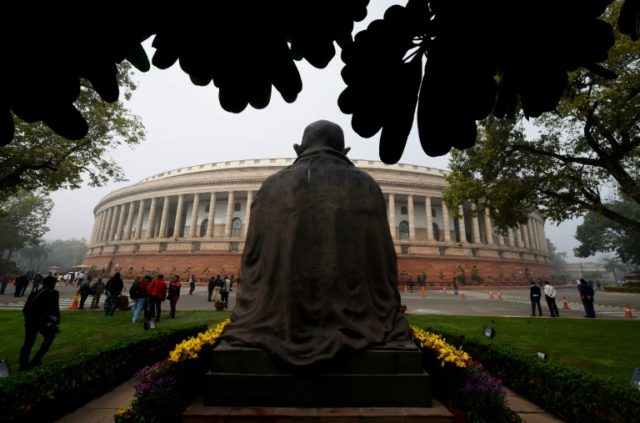New Delhi (AFP) – India’s finance minister pledged to raise spending on the rural poor and halved the basic rate of income tax in his annual budget Wednesday, seeking to ease the pain of a shock move to ban high-value banknotes.
Arun Jaitley defended so-called demonetisation, saying it would increase revenues by forcing people to declare untaxed wealth, but conceded it had hit the economy and promised relief for the poor and middle classes ahead of key polls.
Jaitley pledged to double the income of farmers, who have been hard hit by the currency ban, in the next five years and bring 10 million households out of poverty by 2019.
He also promised more affordable housing for the poor and halved the basic rate of income tax to five percent.
“My overall approach while preparing this budget has been to spend more in rural areas, poverty alleviation through fiscal prudence,” Jaitley said in a speech to parliament.
The finance minister said tax evasion had become India’s “new normal” as he laid out further measures to increase the number of people paying their taxes after last November’s currency ban.
He said the rate cut was intended to reward those already paying income tax, and encourage more to do so. The basic tax rate applies to those with annual incomes of between 250,000 rupees ($3,700) and 500,000 rupees.
“We are largely a tax non-compliant society. When too many evade tax, the burden falls on those who are honest,” Jaitley said.
– ‘Historic reform’ –
Prime Minister Narendra Modi’s unanticipated decision removed around 86 percent of India’s cash at a stroke, triggering massive queues outside banks and a cash shortage that has hit businesses across the country.
Analysts said the budget was in line with expectations that the government would target communities worst hit by the move, with elections beginning in the key battleground state of Uttar Pradesh later this month.
“That’s applying a balm to this segment, which is broadly the lower middle class and which has been more vulnerable to the cash ban,” said Sunil Sinha, principal economist at India Ratings & Research, referring to the tax cut.
“This is what’s been the flavour of the budget — to reduce the pain of demonetisation.”
Jaitley relaxed India’s fiscal deficit target to 3.2 percent for the financial year 2017/18, citing the increase in government spending, but said it would be back on track for a three-percent deficit the following financial year.
He announced plans to spend a record 3.96 trillion rupees on infrastructure including modernisation of India’s roads, airports and crumbling railways.
That includes a trillion-rupee plan to improve safety on the railways after a slew of deadly accidents.
Targeting corruption, Jaitley announced a ban on cash transactions worth more than 300,000 rupees and said the government was considering new legislation to seize the assets of “big time offenders” who flee abroad.
Indian banks are currently trying to recover more than $1 billion owed by the Formula One tycoon Vijay Mallya who left the country for Britain last year.
On Tuesday the government lowered its growth forecast for the 2016-17 fiscal year ending in March to 7.1 percent, down from 7.6 percent in the previous year.
Jaitley said India had undergone “historic reform” over the past year, but remained an “engine of global growth”.
Modi’s government swept to power in 2014 on a promise to tackle corruption and bring about the economic reforms needed to increase growth and provide jobs for a rapidly expanding young population.
Some of its proposed reforms were blocked by the upper house, where the ruling Hindu nationalist Bharatiya Janata Party (BJP) lacks a majority.
The upcoming elections in five states including India’s most populous, Uttar Pradesh, offer a chance for the party to win more seats because most members of the upper house are indirectly elected by state legislatures.

COMMENTS
Please let us know if you're having issues with commenting.